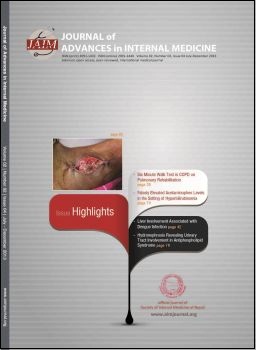Study of lipoprotein (α) in patients of acute coronary syndrome and effect of low dose nicotinic acid on its serum level
DOI:
https://doi.org/10.3126/jaim.v2i2.8778Keywords:
lipoprotein(a), acute coronary syndrome, nicotinic acidAbstract
Background and aims - Lipoprotein(a) is not an established independent risk factor. This study aims to observe whether lipoproteina(Lpa) is significantly high in patients of acute coronary syndrome (ACS) in comparison to healthy control. The second part of the study is aimed to know whether oral nicotinic acid treatment lowers Lpa level significantly.
Methods - This is a prospective case control study with quasi-experimental design done on acute coronary cases admitted in our centre. Total 200 cases of ACS were included as cases and 46 healthy volunteers were controls. In later part of the study those patients who had high Lpa and were eligible were treated with nicotinic acid for 3 months and Lpa was measured again.
Results - Mean Lp(a) level was 39.7mg/dl (±17) among the 200 ACS cases admitted in CCU with the maximum of 83 and minimum of 14. Among controls mean Lpa was 22mg/dl (±3.04) with maximum of 44 and minimum of 17mg/dl. Difference was significant with p value of < 0.01. It was observed that nobody discontinued the drug because of side-effects. In these patients there was significant reduction in serum Lpa level from 74.1mg/dl (± SD22.2) to 43.2mg/ dl (± SD21.9) p<0.01.
Conclusion - The serum level of Lpa was significantly high in patients with ACS patients in comparison to control. This difference however was not significant between STEMI and NSTEMI patients. Low dose Nicotinic acid reduces Lpa significantly and is well tolerated by the patients.
DOI: http://dx.doi.org/10.3126/jaim.v2i2.8778
Journal of Advances in Internal Medicine 2013;02(02):61-64
Downloads
Downloads
Published
How to Cite
Issue
Section
License
This license enables reusers to distribute, remix, adapt, and build upon the material in any medium or format, so long as attribution is given to the creator.




